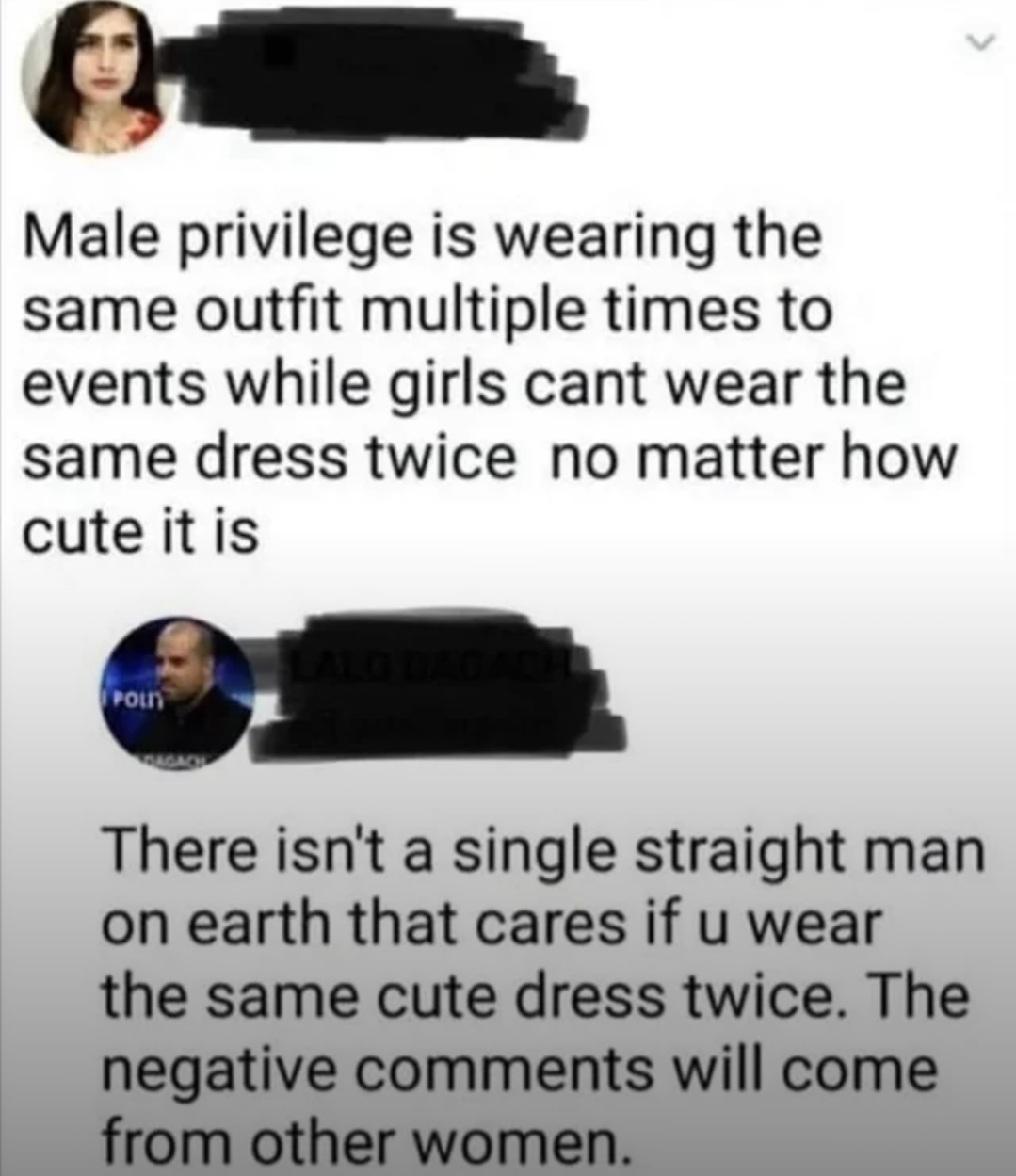this post was submitted on 23 Oct 2024
1050 points (89.4% liked)
Funny: Home of the Haha
5674 readers
1047 users here now
Welcome to /c/funny, a place for all your humorous and amusing content.
Looking for mods! Send an application to Stamets!
Our Rules:
-
Keep it civil. We're all people here. Be respectful to one another.
-
No sexism, racism, homophobia, transphobia or any other flavor of bigotry. I should not need to explain this one.
-
Try not to repost anything posted within the past month. Beyond that, go for it. Not everyone is on every site all the time.
Other Communities:
-
/c/TenForward@lemmy.world - Star Trek chat, memes and shitposts
-
/c/Memes@lemmy.world - General memes
founded 1 year ago
MODERATORS
you are viewing a single comment's thread
view the rest of the comments
view the rest of the comments

I disagree. The first tweet IS right. It is male privilege that men can wear the same outfit multiple times, and it doesn't imply it's enforced by men, it just states that it exist. The fact that women enforce this double standard IS male privilege even when men aren't to blame
Got it. Even when men aren't involved in it, even when they don't much notice, it's still men's fault.
Thought experiment: tell us what isn't somehow men's fault.
That wasn't what I said. I'm going to give you the benefit of the doubt tho, and try to explain it. You are somehow thinking that having a privilege in a system is the privileged's fault, when in reality they are too a victim of the same system. Of course men aren't at fault here in this situation, but they still have privilege in it. In this scenario that means men don't have to worry about repeated usage of clothes the way women do, so they are in a favoured position, they are privileged. This is what it means. No one here is saying that men are the culprit of this system, rather that men don't experience the same social pressure when it comes to clothes.
I see what you're saying but I don't think it truly works that way in practice. As an example, what do we call the fact that women can wear lightweight and breathable clothing (dresses / skirts / spaghetti straps) to work when it's hot while men have to wear pants and long sleeves? Based on your description it seems like that would be called female privilege but I don't think I've ever heard that phrase used in a genuine fashion before.
That, I think, is why the inference is drawn that men are being blamed for creating the situation when the word male privilege is used. It may theoretically refer to a concept that applies to both men and women but in practice you only ever hear about the situations in which men are seen to benefit. If we don't have the other side of the conversation then it feels like that other side doesn't exist even if it is intended to.
English Is not my first language, but I agree that should be called female privilege. The same when women don't get drafted. I think that inference you mentioned is one of the reasons people have negative thoughts about feminism, when in reality all it aims to do is get rid of the different social pressure men and women receive. The point of feminism is not to hate men, but to disentangle our society of harmful expectation, to make it more fair for both men AND women. Circling back to the clothes thing, feminism would have it for women to not be judged by women for repeating clothes, and to give another opposite example, feminism would have it for men to have an easier time entering childcare.
"Based on your description it seems like that would be called female privilege but I don’t think I’ve ever heard that phrase used in a genuine fashion before."
I don't get the concept that you need to hear other people use 'female privilege' specifically in some kind of way for there to be privilege to be applied to women, that's a very strange Idea, white women in particular have often been used as the biggest examples of white privilege, both as the persons being favored and the enforce or catalyst of violence. You seem much more wrapped up in some kind of sectarian US Against THEM dichotomy rather than even engaging with the discussion.